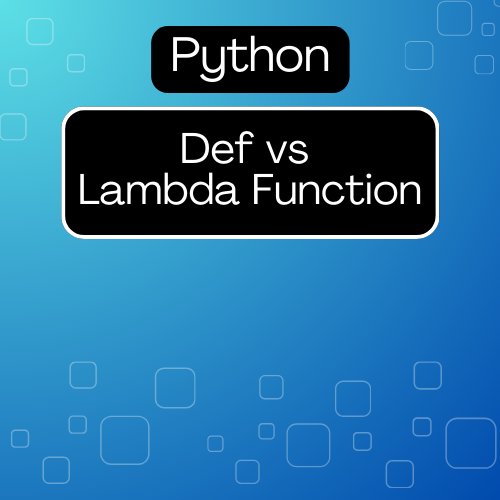In Python, both def and lambda are used to create functions, but they serve different purposes and have different characteristics. Let’s explore their differences in an engaging and easy-to-understand way.
Understanding Function Creation in Python
When I first started learning Python, I came across two ways to define functions: using def and lambda. At first, I found myself confused about when to use each one. So, let’s break it down!
Def- The Traditional Function Definition
Using def is the classic way to define a function in Python. It allows you to create a named function with multiple lines of code and supports complex logic. Here’s how you do it:
Syntax:
def function_name(parameters):
# code block
return result
Example:
def add(x, y):
return x + y
result = add(3, 5)
print(result) # Output: 8
Key Features of def:
- Named Functions: Functions defined with def have a name, making them easy to call.
- Multiple Lines: You can write multi-line code blocks inside the function.
- Return Statements: You can return a value using the return statement.
- Documentation: You can add docstrings to describe what the function does.
Lambda- The Anonymous Function
On the other hand, lambda creates an anonymous function (a function without a name). It’s often used for short, simple operations, especially as arguments to higher-order functions (like map , filter, sorted). Here’s how you create a lambda function:
Syntax:
lambda parameters: expression
Example:
add = lambda x, y: x + y
result = add(3, 5)
print(result) # Output: 8
Key Features of Lambda:
- Anonymous Functions: Lambda functions do not have a name, making them useful for short tasks.
- Single Expression: They can only contain a single expression, which is evaluated and returned.
- Compact Syntax: Lambda functions are more concise and can be defined in-line, which is handy for quick operations.
- Limitations: You cannot add complex logic or multiple statements inside a lambda function.
When to Use def vs lambda
- Use def when:
- You need a reusable function that might contain multiple lines of code.
- You want to include detailed documentation or comments.
- Your function performs complex operations or logic.
- Use lambda when:
- You need a simple function for short-term use (like in sorting or filtering).
- You want to create a quick function without needing to formally define it.
- The function logic is simple and can fit into a single expression.
Conclusion
Both def and lambda have their unique places in Python programming. The def keyword gives you the power to create detailed, reusable functions, while lambda allows for quick, anonymous functions for simple tasks. Understanding the differences and knowing when to use each will make your coding experience smoother and more effective. So, whether you’re crafting a complex algorithm or just need a quick operation, you now know which tool to reach for
